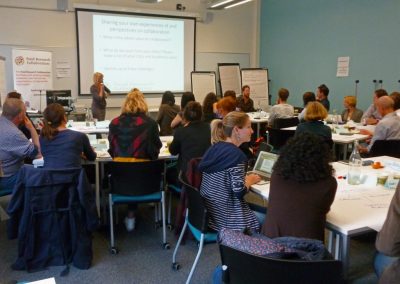
Workshop participants listen to a presentation at the FRC workshop on Oct. 5, 2016 ©Food Research Collaboration
On Wednesday October 5th, the Food Research Collaboration (FRC), an initiative in the UK that brings together academics and Civil Society Organizations (CSOs) around food issues, held a workshop to discuss the challenges and opportunities involved in working in community-campus partnerships (CCPs). The event was a success, with participants agreeing to work collaboratively for a better, more just food system.
The event opened with short presentations on CCP experiences – both those documented in the literature, and those experienced by some of the participants. The conversation then focused on three main areas, specifically, what adds value to CCPs, what CSOs and academics want from each other in these CCPs, and what challenges both parties face.
The delegates came up with many different points highlighting the opportunities and challenges when working in CCPs. They also discussed how the various challenges identified could be addressed or mitigated. The conversation resulted in a list of actions for the FRC to take forward in the coming year.
The work of the FRC is particularly relevant to CFICE’s Community-Campus Engagement (CCE) Brokering (Food Sovereignty) Working Group. This working group has been studying the work and structure of the FRC as a model for their own pilot brokerage initiatives. Notably, the FRC’s event in October provided the CCE Brokering (Food Sovereignty) working group with some useful findings on community-campus partnerships in the UK that they are hoping to extrapolate and build upon in the Canadian context.
To read more about the event, visit the FRC’s website. To access the presentations and reports prepared and delivered by the FRC, please use the links below.
Presentations:
Benefits and Challenges of CSO-Academic Collaboration
Improving CSO-Academic Collaboration
Reports:
Knowledge That Matters: Realising the Potential of Co-Production